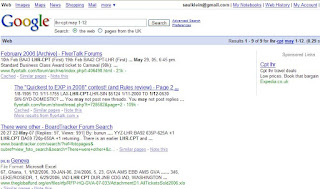Beauty of One Box Search
Google has made one-box searching a pleasure for the web. If the query is pretty simple and you want to find a web site rather than data, then the results, by and large are pretty good.
But you're in real trouble when you try more complex queries like "flights from London to Cape Town from May 1-12" or "property in Tribeca with 3 bedrooms". The results on Google are useless.

Traditionally vertical search engines have been better than Google at getting the right results but they have been unable to deliver a service in an such simple way with "one-box search".
Recently, Mobimissimo (an Index investment) in travel and DotHomes (a TAG investment, which used to be called Extate) in property have started to break this mould.
Although category coverage is very important in vertical search, this is relatively easy to do compared to general areas like the web, images or video as the sources of information are generally well known and fairly limited. Of course, there are major challenges in structuring data and keeping it fresh but coverage is only one piece of the jigsaw - search was never won by index size alone.
Both Mobimissimo and DotHomes offer similar or more coverage than their better known rivals such as Kayak or Trulia. But what is probably most interesting about Mobimissimo and DotHomes is that they allow queries and deliver results in an interface that is much more natural and intuitive to use -- the fabled "one-box".
To find flights on Kayak from London to Cape Town will mean you have to engage with at least 4 boxes;

with Mobissimo its one-box and when you get your results you can easily change currency, see local weather, photos from Flickr and even your Dopplr contacts.

Meanwhile in real estate, if you type "Tribeca 3 beds" into Trulia you get no results - in fact an error page;

but on DotHomes you not get results, you also get the requisite map and of course the ability to further filter results -- one box, natural language queries and immediately.

Of course it doesn't help that the prices are still sky high but at least you can find what you were looking for :)
These are some early examples of what hopefully will be a more general trend in search. Its not easy to do, but when done right a simple and natural query interface can produce a great user experience which will surely drive transaction volume significantly in critical and high-value verticals. Google did this with web search and I think the innovators in vertical search will make similar UI leaps.
If you have any other great examples, I'd love to hear about them.
Labels: dothomes, extate, google, index, kayak, mobissimo, portfolio, property, search, TAG, trulia


